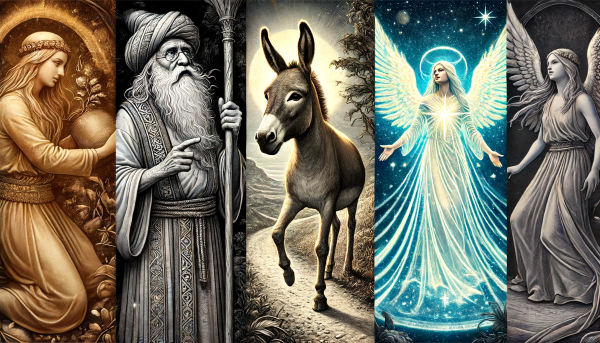
The Bible is filled with fascinating stories, but few are quite as quirky as the one about Balaam’s donkey. This seemingly silly episode from the book of Numbers (22:22-39) packs a surprising punch, offering humor, a powerful message, and yes, a talking donkey!
A Prophet with a Price Tag
Our story starts with Balaam, a renowned prophet known for his unique ability – he could bless or curse people with his words. His reputation for wielding mystical power made him a valuable asset to those in power. However, Balaam’s morals weren’t exactly ironclad. When King Balak of Moab, fearing the growing Israelites, offered him riches to curse them, Balaam was initially tempted.
God’s Clear Instruction, Balaam’s Cloudy Judgment

Despite the king’s tempting offer, Balaam consulted God. Here’s the twist: God explicitly forbade Balaam from going with the Moabites, instructing him not to curse the Israelites because they were blessed. This should have settled the matter, but greed can be a powerful fog. Blinded by the promise of wealth, Balaam decided to go anyway.
The Donkey Knows What’s Up (Literally)
Balaam set off on his journey with his loyal donkey by his side. However, the trip took an unexpected turn. The Angel of the Lord, a celestial guardian protecting the Israelites, stood in their path. Here’s the kicker: the Angel was invisible to Balaam, but not to his donkey! The wise donkey, sensing the danger, swerved to avoid it, much to Balaam’s frustration.
A Talking Donkey?!

This comical scene unfolded three times, each time with Balaam getting increasingly frustrated and mistreating his poor donkey for what he perceived as stubbornness. Finally, in a surprising twist, God intervened. He opened the donkey’s mouth, and guess what? The donkey spoke!
The once silent beast questioned Balaam’s harsh treatment, revealing the true purpose of their journey and Balaam’s disobedience. This unexpected voice of reason opened Balaam’s eyes. He finally saw the Angel of the Lord and realized his mistake.
More Than Just a Donkey Joke
The story of Balaam’s Ass goes beyond being a funny anecdote. It offers valuable lessons that resonate even today:
- Following God’s Will: Even a respected prophet like Balaam could be tempted by worldly desires. This story emphasizes the importance of listening to God’s instructions, even when they conflict with our own plans.
- Kindness to All Creatures: The donkey’s perspective challenges human dominance and reminds us to treat all creatures with respect and kindness.
- Unexpected Messengers: God can use anyone or anything to communicate his message. Sometimes, the voice of reason comes from the most unexpected places, like a talking donkey!
So next time you hear a donkey bray, remember Balaam’s story. It’s a reminder to stay true to our convictions, listen for divine guidance, and recognize that wisdom can come from surprising sources.
Here are 5 Bible verses that relate to the themes and lessons from the story of Balaam’s Donkey:
- Following God’s Will
- Proverbs 3:5-6 (NIV): “Trust in the Lord with all your heart and lean not on your own understanding; in all your ways submit to him, and he will make your paths straight.”
- Obedience to God
- 1 Samuel 15:22 (NIV): “But Samuel replied: ‘Does the Lord delight in burnt offerings and sacrifices as much as in obeying the Lord? To obey is better than sacrifice, and to heed is better than the fat of rams.'”
- Temptation of Worldly Desires
- Matthew 6:24 (NIV): “No one can serve two masters. Either you will hate the one and love the other, or you will be devoted to the one and despise the other. You cannot serve both God and money.”
- Kindness to All Creatures
- Proverbs 12:10 (NIV): “The righteous care for the needs of their animals, but the kindest acts of the wicked are cruel.”
- Unexpected Messengers
- Numbers 22:28 (NIV): “Then the Lord opened the donkey’s mouth, and it said to Balaam, ‘What have I done to you to make you beat me these three times?'”
These verses highlight the importance of following God’s will, being obedient, resisting the temptation of worldly desires, showing kindness to all creatures, and being open to receiving messages from unexpected sources. They complement the story of Balaam’s donkey and reinforce its lessons.







